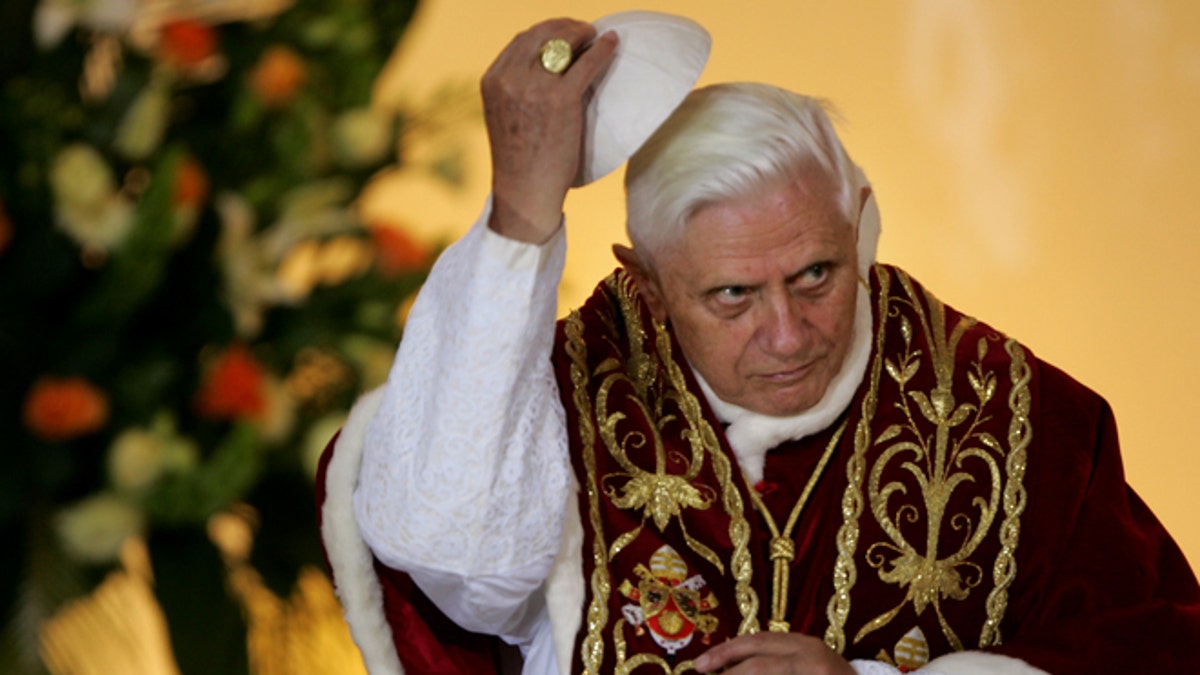
May 25, 2006: Pope Benedict XVI lifting his scull cap during an ecumenical meeting at the Holy Trinity church in Warsaw, Poland. (AP)
Like most Catholics, I found the news of Pope Benedict’s resignation startling and dislocating. Yet I knew at once that only humility of sacrificial proportions could impel this Pope to such a move. This Pope in particular, because a man with his keen intellect and clear vision would anticipate the resultant turmoil of anxiety in the minds and hearts of faithful Catholics and triumphant glee in the busy writings of the Church’s legion of critics.
Pope Benedict carried on the legacy of Pope John Paul II, visiting much of the Spanish-speaking world and bringing the message, literally, that “God is love,” to us all.
Pope Benedict no doubt knew that his haters would take this opportunity to happily announce, once again, the quick demise of an institution they consider hopelessly stuck in the mud of the past. In their view, an institution that refuses to adapt to our brave new world must die. Helpful critics have jumped in to suggest all the obvious changes she must make: married priests, women priests, a warm embrace of same sex marriage.
While the professional critics were busy stating their case for a new, progressive church, I have been recalling my own experiences with the papacy as a Catholic Hispanic woman. I was ten years old and present at Pope John Paul II’s first official international papal trip to Mexico in 1979. He passed right in front of our apartment building in Guadalajara. It made the most tremendous impact on me.
We were all in such a fervor when he came. A fervor of belonging and of membership in the most beautiful, true, divine/human institution, the Church. The months leading up to the visit were full of the most longing anticipation. We sang every day during recess the song that Roberto Carlos wrote for the Pope's visit: Amigo. The song taught us that Pope John Paul II was our friend. That Jesus was our friend. The choir of children who greeted the Pope in Mexico City sang this song on his arrival, broadcast to hundreds of millions of people worldwide. We still sing it in Mass today, and it still brings tears to our eyes. My American children know all the verses by heart.
Hispanics are fiercely proud of our membership in the Church. Perhaps we owe this to Pope John Paul, our friend, who smiled at us as he passed down avenue where we worked and played. Who humbly kissed the pavement at the airport in Mexico City. Who made our beautiful Virgencita de Guadalupe (La Virgen Morena) our Empress and gave Juan Diego his due on earth. He brought us in, right to Rome, right to the center of it all. And we deeply respect the Church just as it is. Just as Jesus gave her to us. We do not wish to make it "fit in" with current cultural prejudices and attitudes. She is beautiful and perfect to us, because she is the best part of us.
Pope Benedict carried on the legacy of Pope John Paul II, visiting much of the Spanish-speaking world and bringing the message, literally, that “God is love,” to us all. We are proud of him, not ashamed, and we watched his last papal audience with the deepest affection.
Of course, the Church’s critics cannot believe that a 2000 year-old institution, holding fast to her values and morals with the same tenacity seen in her early martyrs, can be anything but hopelessly wrong. But we know better. As we bid farewell to this Pope and look with anticipation to the next, we know we are looking at the guardians of the Church’s timeless truths, truths that will still be standing when the current batch of critics is long gone.
